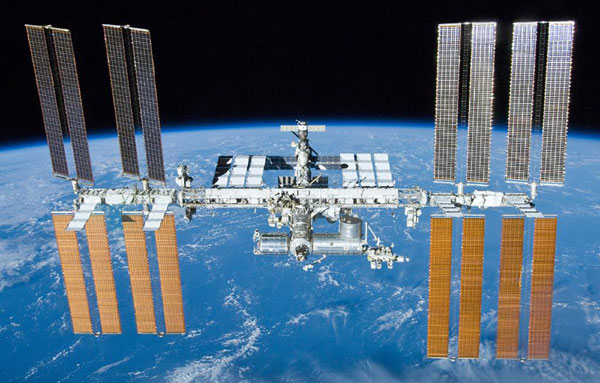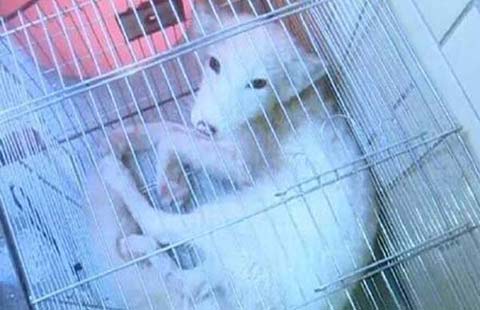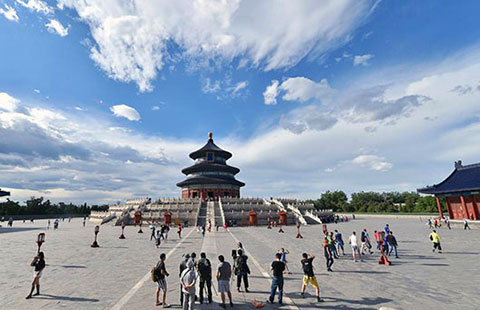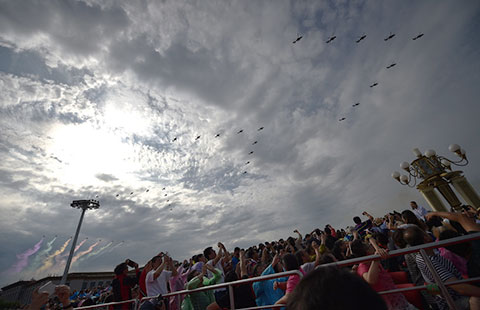Chinese experiments to be carried out on space station
By Zhao Lei (China Daily) Updated: 2015-08-08 07:37
A Chinese university will send scientific equipment to the International Space Station in collaboration with a private company in the United States, a move that will help explore opportunities for space cooperation between China and the US, a senior Chinese scientist said.
|
 |
|
The International Space Station is seen in an undated NASA handout picture. Commander Terry Virts of NASA is scheduled to hand over command of the International Space Station to cosmonaut Gennady Padalka of the Russian Federal Space Agency on June 10. 2015. [Photo/Agencies] |
Direct deals between US government entities and China are prohibited by US law, but the latest proposal teams up with private businesses.
"This project underwent a succession of prudent discussions and careful deliberations before we reached the agreement. The US company NanoRacks will send our equipment to the International Space Station to conduct experiments on the space environment's impact on genes. The results will answer some very important questions on life sciences," Deng Yulin, dean of the Beijing Institute of Technology's School of Life Science, said on Friday.
"There has been no official cooperation in the space field between China and the US for a long time, so I hope this project enables us to explore cooperation methods between the two space powers," he said.
The Houston Chronicle reported this week that Deng's school has signed an agreement with Houston-based NanoRacks, which helps scientists and businesses conduct research aboard the space station. Chinese equipment will be transported into space by California-based SpaceX vehicles.
The contract, valued at $200,000, includes delivery of the Chinese experimental devices to the US side of the station via a SpaceX Dragon spacecraft, as well as a berth in NanoRacks' orbiting laboratory facilities, the report said, noting that the company will send data back to the Chinese researchers.
"It's symbolic, and it's meaningful," Jeffrey Manber, co-founder and managing director of NanoRacks, told the Chronicle.
Deng would not disclose the amount of money involved in the project, citing trade secrets.
However, he said NanoRacks offered his institute some "very favorable terms", including those on payment.
The space station, now the largest man-made body in orbit, is a joint endeavor between the US, Russia, Canada and Japan, along with the European Space Agency. However, because of a US law introduced in 2011, China is unable to participate, even though its space officials have repeatedly expressed interest.
Under the US law neither NASA nor the White House Office of Science and Technology Policy may "develop, design, plan, promulgate, implement or execute a bilateral policy, program, order or contract of any kind to participate, collaborate or coordinate bilaterally in any way with China or any Chinese-owned company," including "the hosting of official Chinese visitors at facilities belonging to or utilized by NASA".
Deng said the project is purely commercial and serves only scientific purposes.
"My university is an educational entity, and the project is a business activity, so I don't think it will violate the US law," he said.
The US National Research Council said in a report in June last year mandated by the US Congress that the ban on NASA-China ties "denies the US partnership with a nation that will probably be capable of making truly significant contributions to international collaborative missions".
During a May television interview on CNN, Chinese astronauts said they aspire to joint flights with their foreign counterparts in space, adding that the country's future space station will be open to foreign astronauts.
"As an astronaut, I have a very strong desire to fly space missions with astronauts from other countries. And I look forward to the opportunity to visit the International Space Station," said Nie Haisheng, crew commander of the landmark Shenzhou X manned space mission in 2013.
Yang Liwei, the country's first man in space and the current deputy director of the China Manned Space Agency, said earlier that China is open to cooperation with other nations in its space station project.
"We reserved a number of platforms that can be used for international cooperative projects inside our future space station when we designed it," Yang said. "In addition to collaboration on applied experiments, we also designed adapters that can dock with other nations' spacecraft."
If everything goes well, China will have its own space station in operation around 2022, the space agency said.
- Delegation salutes Tibet anniversary
- Officials are told to act as anti-graft watchdogs
- Great Wall safeguarded in united action
- Vice minister pledges more efforts to improve air quality
- Beijing’s efforts to control air pollution start to pay off
- China's military committed to reform
- Netizens rip singer over baby photos
- Central govt's growing support for Tibet
- Monument to be built on Tianjin blast site
- China and Russia seal raft of energy deals







